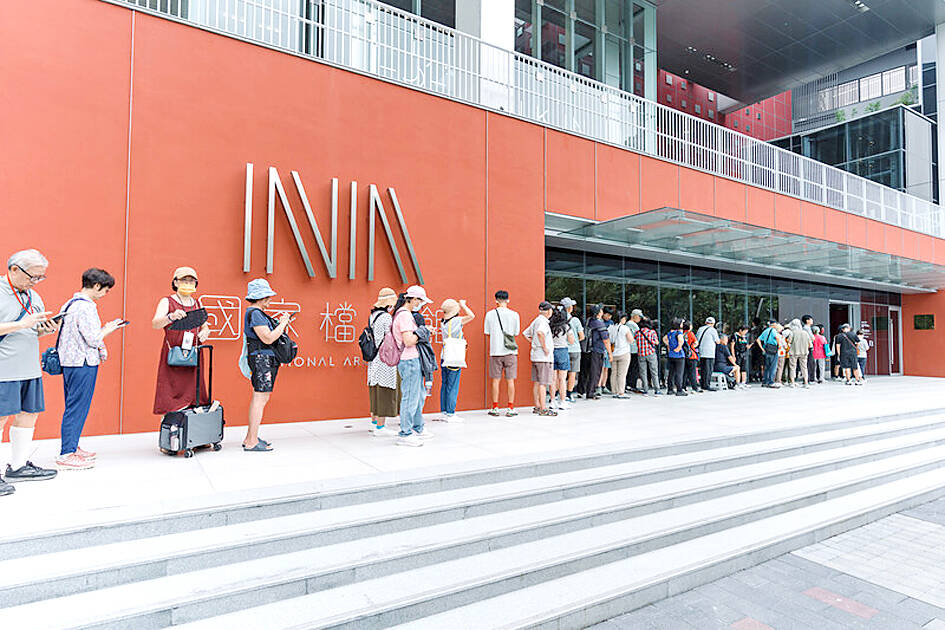Taiwan’s first National Archives, located in Linkou District (林口), New Taipei City, has drawn more than 100,000 visitors since its soft opening on Sept. 2, featuring exhibits on the nation’s high-tech development and documents by Taiwan Semiconductor Manufacturing Co (TSMC) founder Morris Chang (張忠謀), the National Archives Administration (NAA) said yesterday.
A centerpiece of the archives is the permanent exhibition "Island Reading: Our Story," which presents rare government records chronicling Taiwan’s economic transformation and the roots of its high-tech industry in the 1970s and 1980s.
Among the highlights are documents related to the establishment of the Industrial Technology Research Institute and Chang’s policy proposals outlining a blueprint for the country’s electronics sector.

Photo: CNA
One notable exhibit showcases Chang’s 1981 recommendations to the Executive Yuan, in which he urged a transition from labor-intensive to technology-driven industries — a vision that helped shape Taiwan’s rise as a global technology hub.
The archives’ first to third floors are open to the public and include permanent and special exhibitions, a children’s interactive area, cultural and creative shops and a cafe.
The upper floors house professional facilities for the preservation, maintenance and research of archival materials.
NAA Director Lin Chiu-yen (林秋燕) said public enthusiasm since the Sept. 2 trial opening has far exceeded expectations.
The agency is improving visitor flow and signage ahead of the official opening on Nov. 22, which would coincide with the NAA’s 25th anniversary, she added.

A strong continental cold air mass is to bring pollutants to Taiwan from tomorrow, the Ministry of Environment said today, as it issued an “orange” air quality alert for most of the country. All of Taiwan except for Hualien and Taitung counties is to be under an “orange” air quality alert tomorrow, indicating air quality that is unhealthy for sensitive groups. In China, areas from Shandong to Shanghai have been enveloped in haze since Saturday, the ministry said in a news release. Yesterday, hourly concentrations of PM2.5 in these areas ranged from 65 to 160 micrograms per cubic meter (mg/m³), and pollutants were

Taiwan’s armed forces have established response protocols for a wide range of sudden contingencies, including the “Wan Chun Plan” to protect the head of state, the Ministry of Defense (MND) said today. After US President Donald Trump on Saturday launched a series of airstrikes in Venezuela and kidnapped Venezuelan President Nicolas Maduro, concerns have been raised as to whether China would launch a similar “decapitation strike” on Taiwan. The armed forces regularly coordinate with relevant agencies and practice drills to ensure preparedness for a wide range of scenarios, Vice Minister of National Defense Hsu Szu-chien (徐斯儉) told reporters before a

EVA Airways on Saturday said that it had suspended a pilot and opened an investigation after he allegedly lost his temper and punched the first officer several times as their plane was taxiing before takeoff at Los Angeles International Airport. According to a report published on Thursday by The Reporter, the incident occurred after the flight’s Malaysian first officer tried to warn the Taiwanese pilot, surnamed Wen (文), that he was taxiing faster than the speed limit of 30 knots (55.6kph). After alerting the pilot several times without response, the first officer manually applied the brakes in accordance with standard operating

Japanese Councilor Hei Seki (石平) on Wednesday said that he plans to visit Taiwan, saying that would “prove that Taiwan is an independent country and does not belong to China.” Seki, a member of the Japan Innovation Party, was born in Chengdu in China’s Sichuan Province and became a naturalized Japanese in 2007. He was elected to the House of Concilors last year. His views on the Chinese Communist Party (CCP) — espoused in a series of books on politics and history — prompted Beijing to sanction him, including barring Seki from traveling to China. Seki wrote on X that he intends